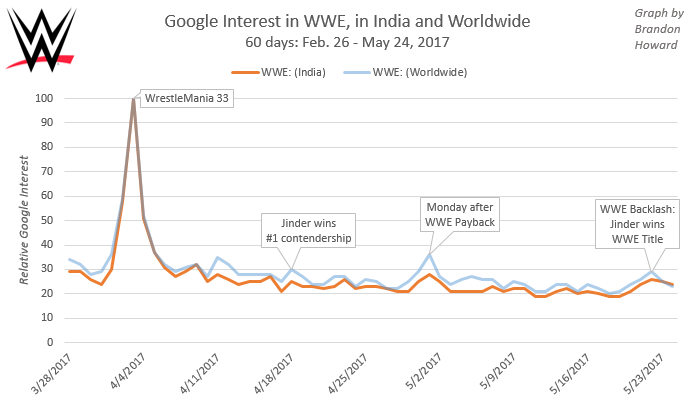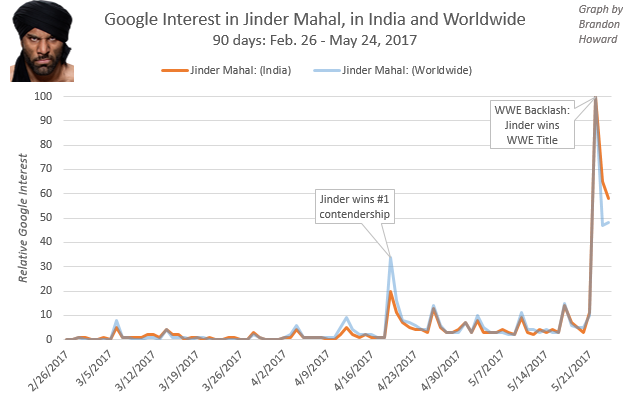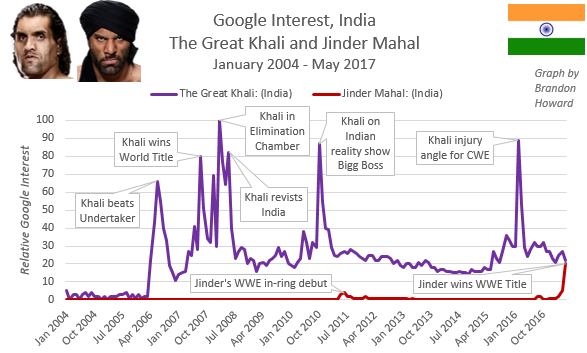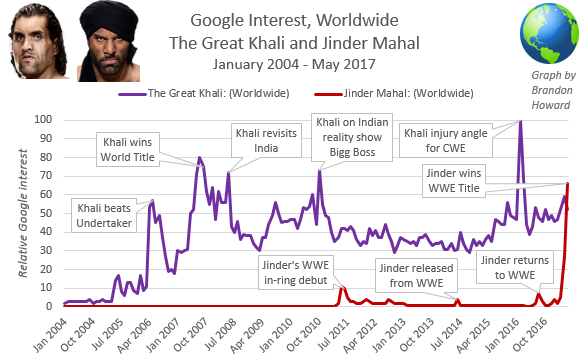Jinder Mahal's capture of the WWE Title on May 21 at the Backlash pay-per-view was pretty clearly driven by the company's desire to break into the Indian market. Mahal, who is Canadian-born and of Indian descent, quickly went from being about as low on the WWE totem pole as anyone to being WWE champion, within just over a month.
With India's large population of 1.3 billion people and its emerging economy, WWE sees a major potential market. The company says India is already its number-one country for social media activity, although actual revenue from the entire Asia Pacific region accounted for only 7% of total WWE revenue in the first quarter of 2017.
Are there any early signs Mahal's push has been effective? One metric we have quick access to is Google Interest: a relative measurement of Google searches related to a given topic, person, brand, etc.
Has there been any uptick in Google interest in WWE from India since Mahal's rise?

There wasn't any remarkable increase in interest in WWE itself. Google interest for both the world and India were pretty average on the days surrounding Mahal's title win at Backlash.
But maybe looking at interest in WWE is too broad. What about interest in Mahal himself?

There definitely was an increase in Google interest related to Jinder Mahal, both in India and worldwide which seems consistent with the amount of chatter I've seen as people talk about and debate over Mahal's title win. Just a few days after his title win, searches for Mahal were slower to wane in India than they waned worldwide, so that seems to suggest those in India were slightly more interested in Mahal around the time of his title win, more so than the rest of the world. However his number-one contendership win on SmackDown on April 18 generated more searches worldwide than in India.
It's hard to say what a single measurement of Google interest like this means in the big picture however. Again, Google offers only a relative measurement of searches over a given period of time. So whatever the peak of interest is will be recorded as 100 and all other data points are held to that standard.
To provide some context, let's compare interest in Jinder Mahal with interest in WWE's previous major Indian star, The Great Khali.

By Mahal's own account on Talk is Jericho, Khali is a very recognizable star in India thanks to his wrestling career. Khali's contract with WWE expired in November 2014. Since then, according to Mahal, Khali has been the main attraction for wrestling shows in India that have drawn crowds of 30,000 and 60,000 in his post-WWE run with the Continental Wrestling Entertainment promotion.
The graph above suggests interest in Mahal winning the WWE Title brought searches in India for him, at least for the moment, up to the level of Khali when there's no major news story about the latter.

When we look at worldwide interest in Khali and Mahal since 2004, the jump in interest around Mahal's title win looks bigger and there's less of a gap between Mahal and Khali. Since Khali and Mahal are stars who we expect to have particular local interest in India and less so worldwide, it makes sense that their performance is closer worldwide than it is in India.
We can't draw from these graphs a conclusion whether Mahal's push was a success or not. We can see though that there's at leats some interest from India surrounding his title win. It may be years before WWE sees real money differences thanks to targeting the Indian market. Due to the economy and supposed corruption it's difficult for WWE to run worthwhile live events in the country. The company last ran there in January 2016. Chris Harrington's report of WWE's schedule of live events through March 2018 didn't list anything for India.
Although Mahal's rise was abrupt and his heel character exercises xenophobic tendencies in WWE's audience, his push may end up in hindsight being viewed as an important move in the company's growth into a big international market. As India's economy develops and its middle class grows and gains more disposal income, the investments WWE is making now in that market may pay off.
Brandon is a feature writer for Fightful.com. Follow him on Twitter @BrandonThurston. Reach him by email at [email protected].




